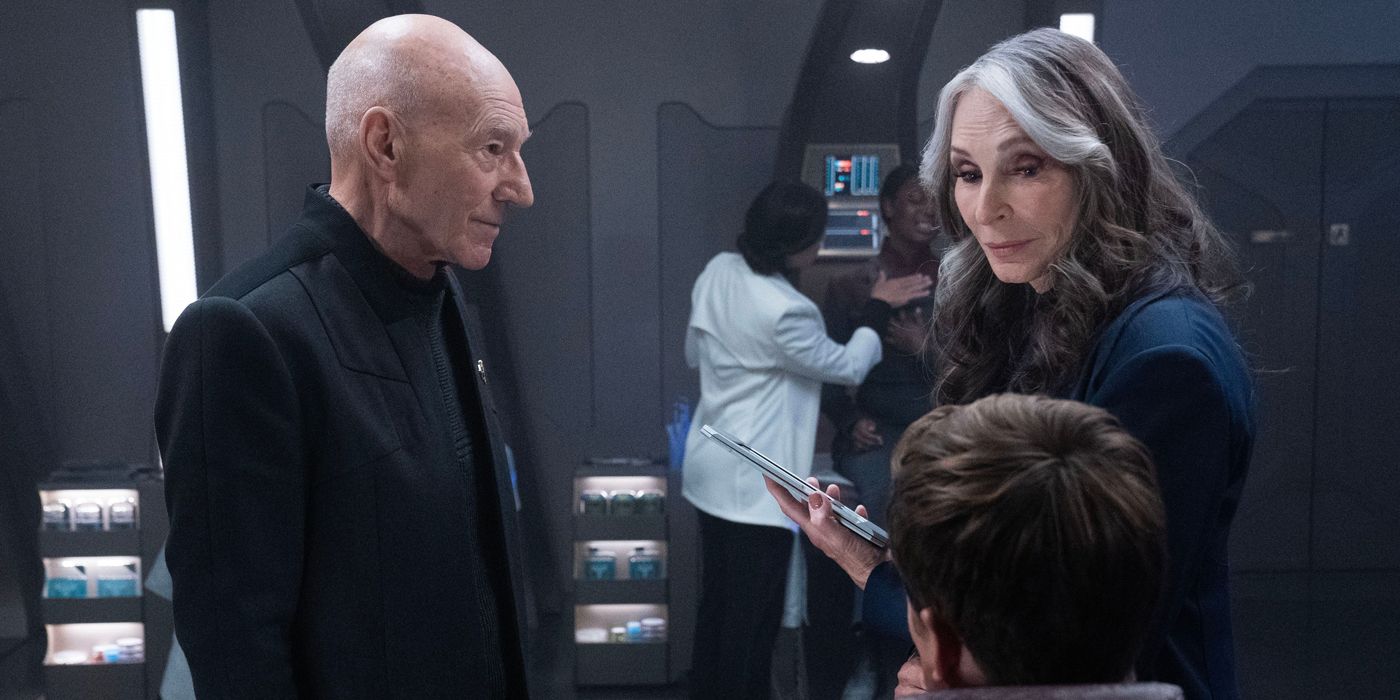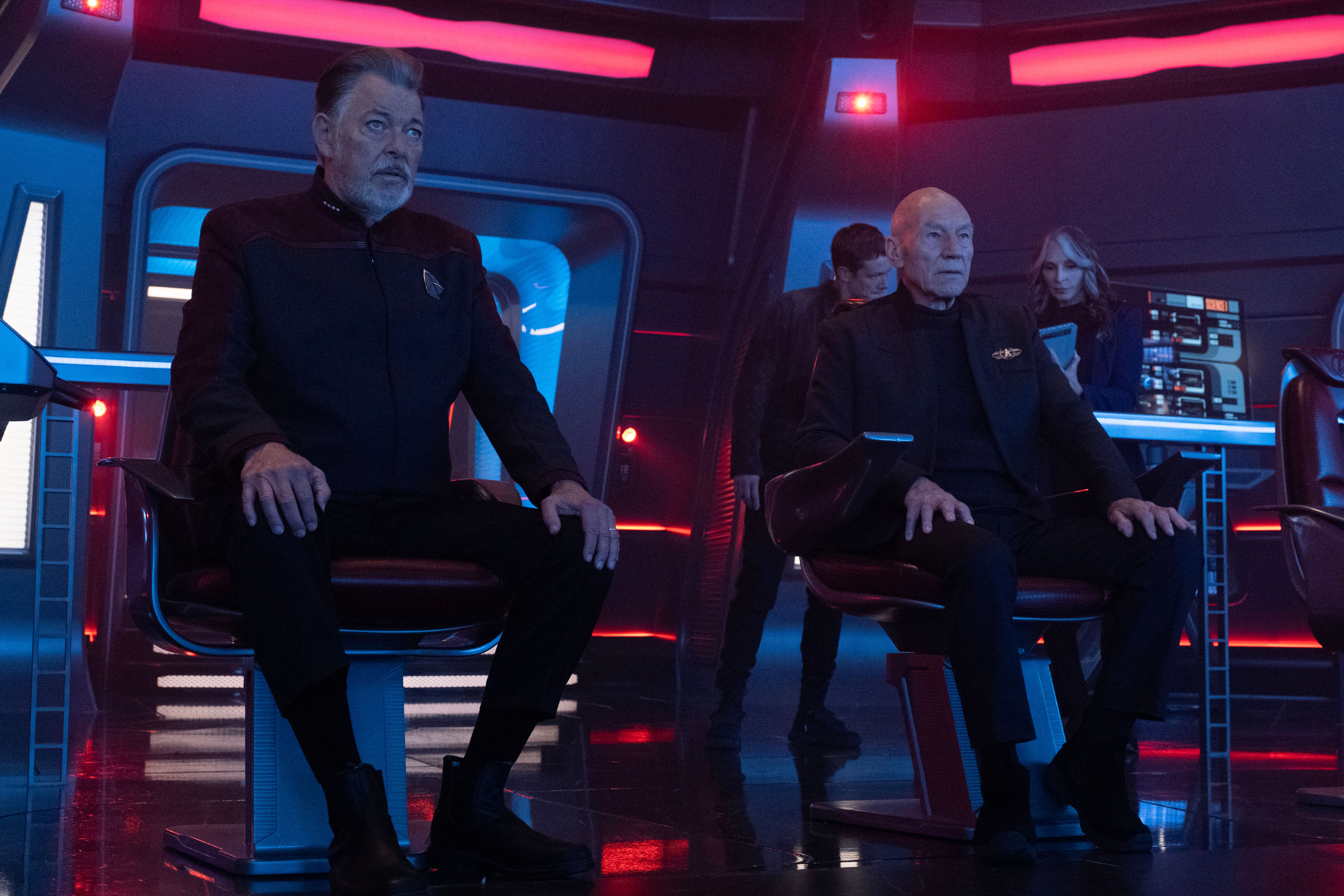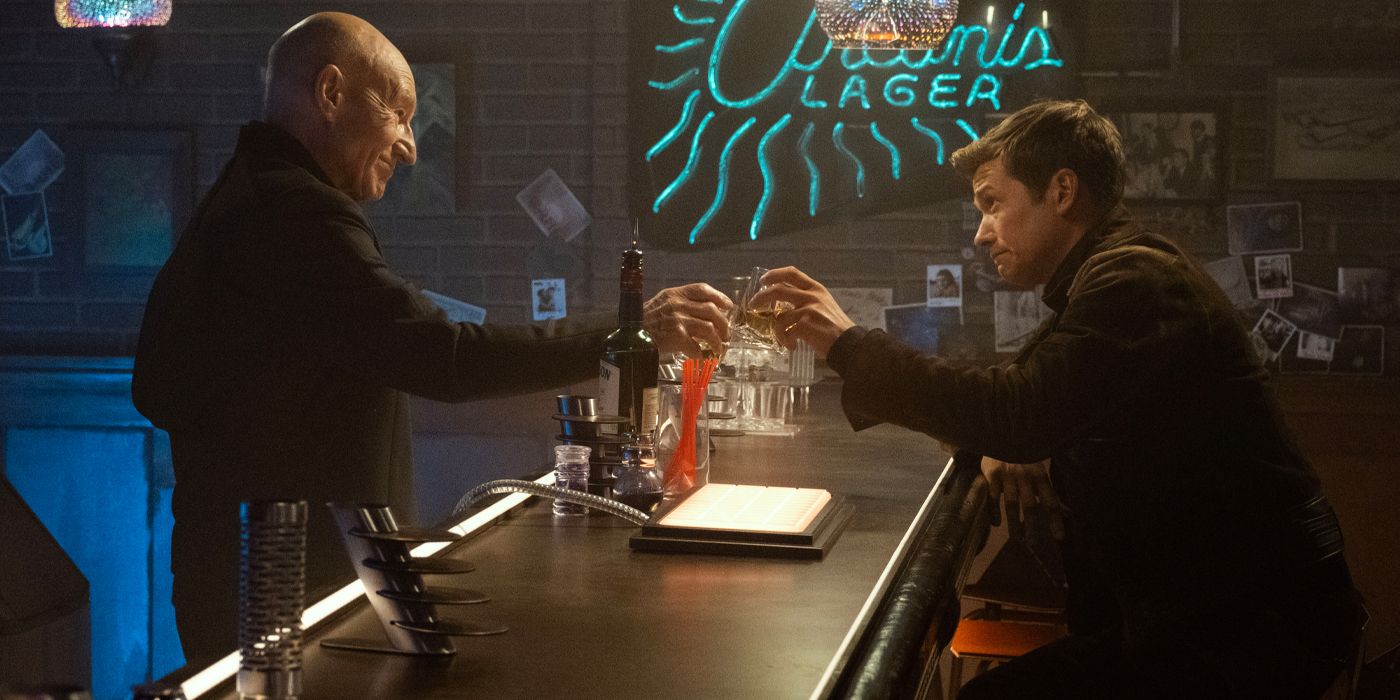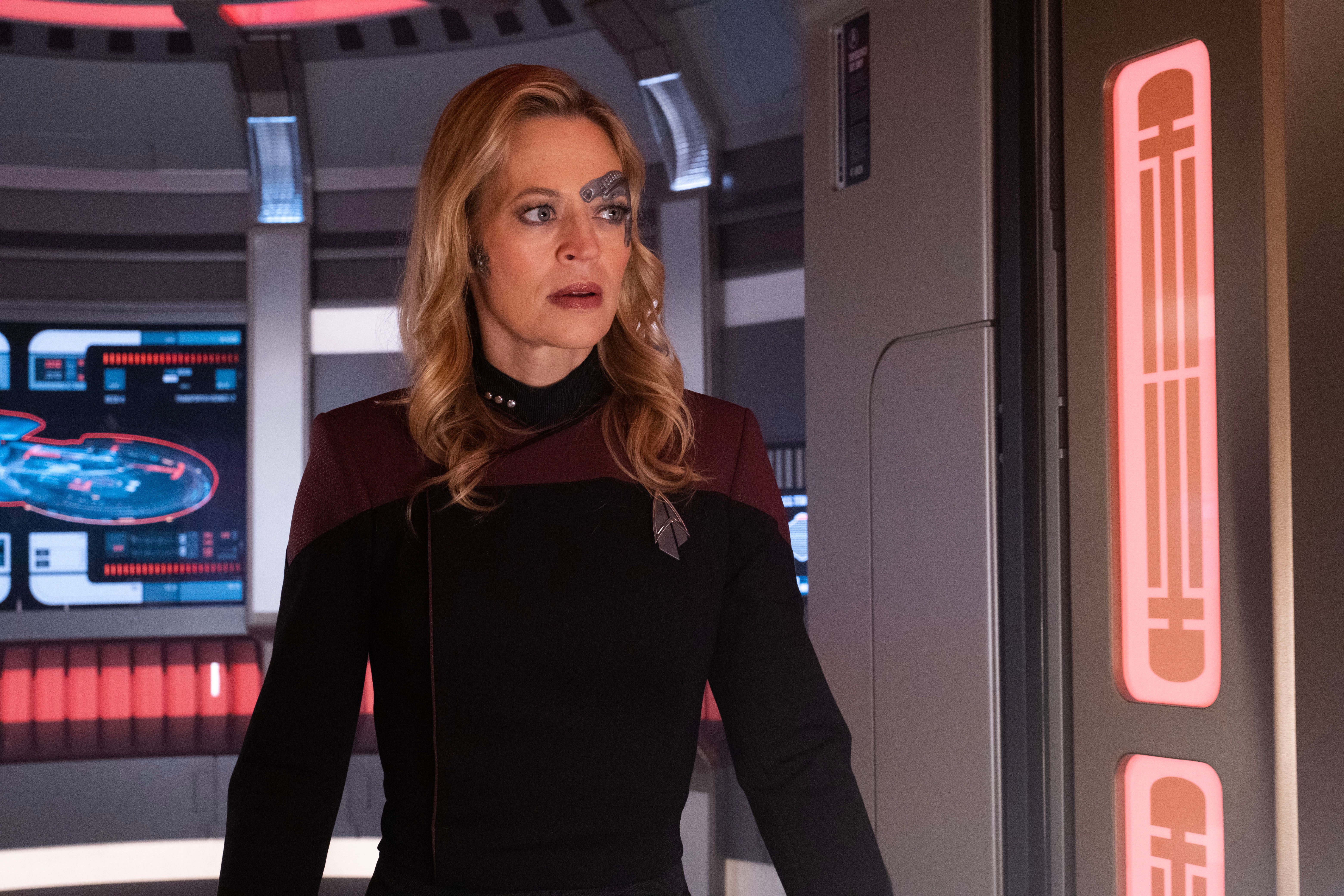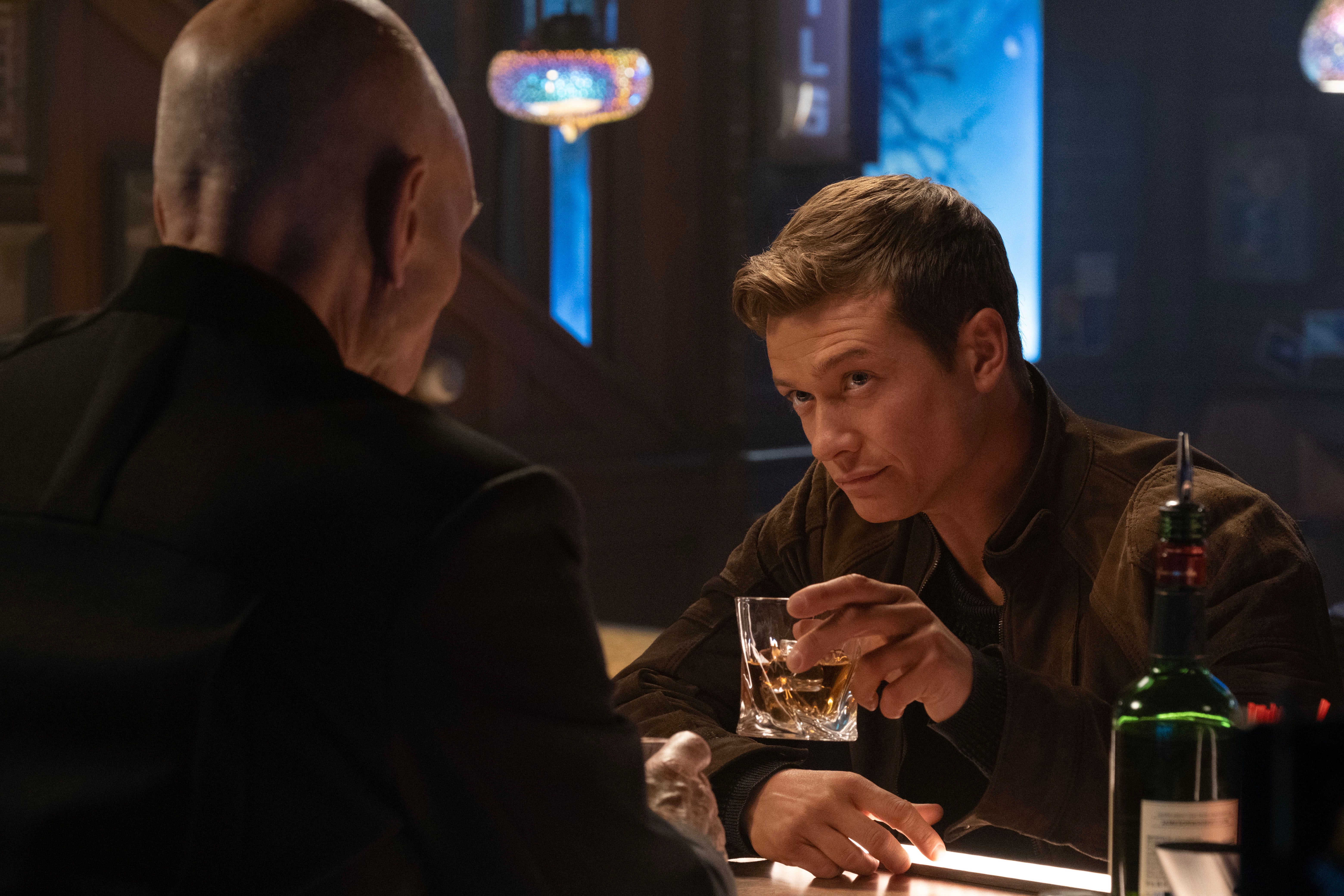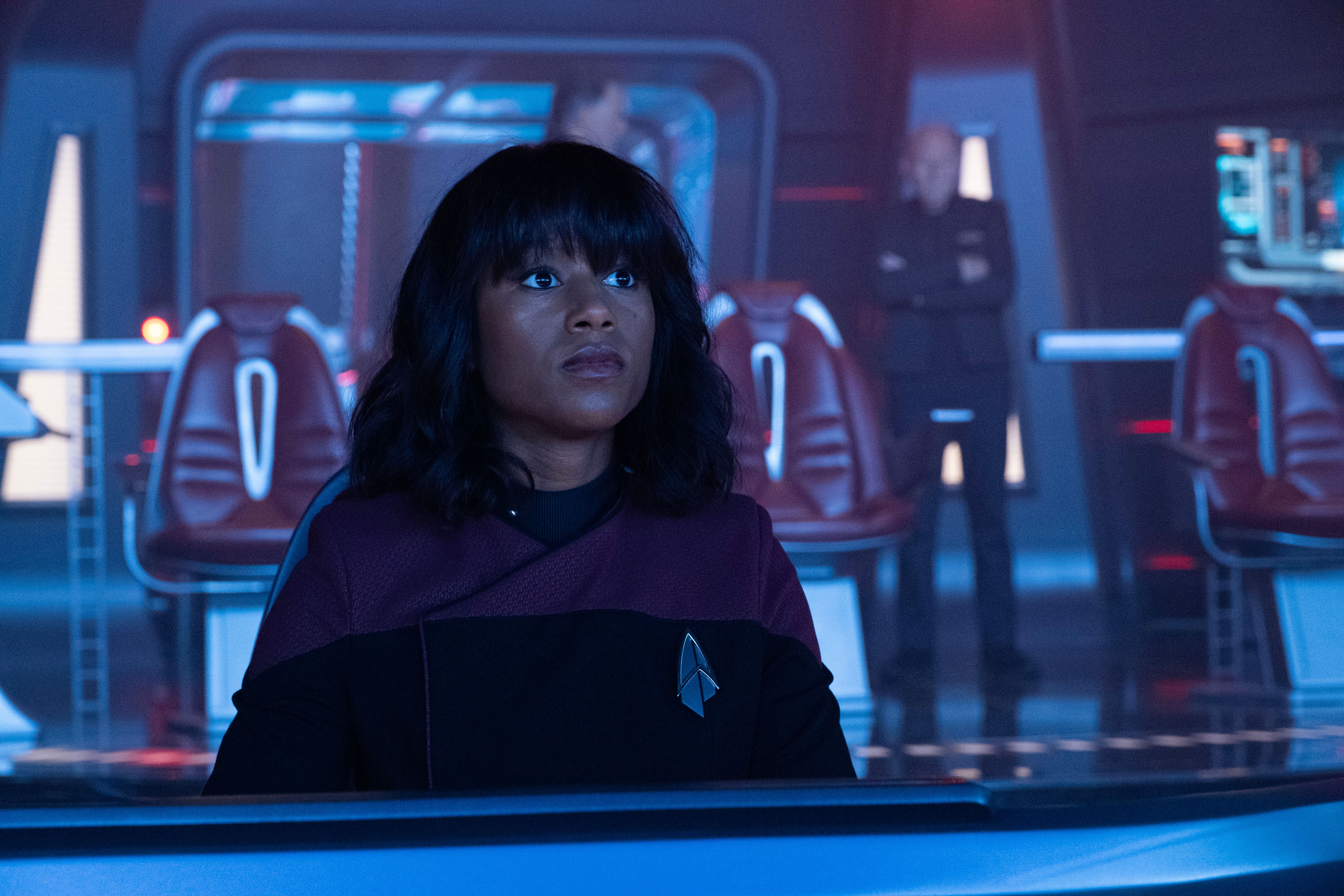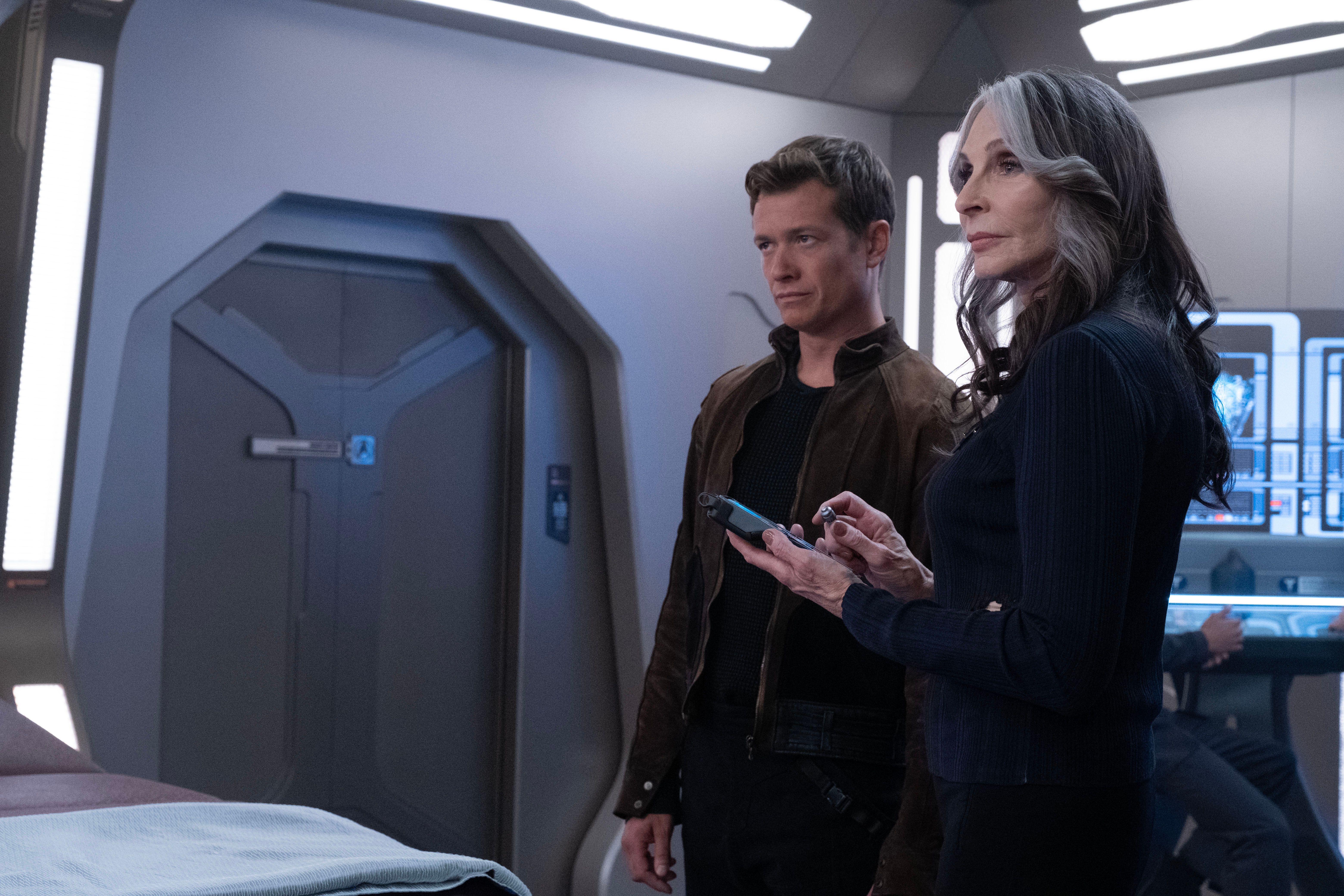With the fate of the crew of the Titan hanging in the balance, the fourth episode of Star Trek: Picard delivers a healthy dose of truth and consequence, as Jean-Luc Picard (Patrick Stewart) takes a moment to get to know his son, Jack Crusher (Ed Speleers), while time is running out. In the midst of the chaos, Seven of Nine (Jeri Ryan) continues investigating the Changeling situation that is unraveling aboard the starship, which leads her to team up with Captain Shaw (Todd Stashwick) to get to the bottom of the mystery. Shaw, who is recovering from last week's episode, also doles out his own truths, which connect back to a dark period in Picard's life.
Ahead of the premiere of Episode 4, Collider had the opportunity to chat with Picard's showrunner Terry Matalas, who also penned "No Win Scenario" with Sean Tretta, about some of the most jaw-dropping moments in the episode, including the flashback to 10 Forward, Picard's revelation about meeting Jack years ago, Shaw's heart-wrenching backstory, and the rationale behind that controversial F-bomb.
COLLIDER: With Episode 4, which is aptly titled “No Win Scenario,” I really loved the 10 Forward flashback and the way that it plays out throughout the entire episode, it's just so good. Aside from the Jack of it all, I am curious to know if we should be filing away the story that Picard is telling to the cadets about the Hirogen, or is it just influencing what they end up having to do to get out of the situation?
TERRY MATALAS: No, I don't think you need to file that away.
It's a fun story.
MATALAS: The Deadfall Trap thing?
Yeah, the whole story that he tells throughout that entire series of flashbacks we get, and the way that it parallels with what's happening in the present is great.
MATALAS: Yeah, just the fact that Jack had indeed heard this story of Jack Crusher and the shuttle before, Picard at one point, he goes, "Did your mother already tell you this story?" He goes, "Well, actually," and Jack was about to tell him and he gets interrupted. That's the first hint that Jack was actually there that day in the bar.
You have Beverly who didn't give Picard this choice, and then you also have Jack who essentially didn't give Picard a choice either because Picard doesn't know he's telling his son that, "I don't need a family, I have Star Fleet." So it's just really interesting because you have this character who's a captain who's very much in control, has always been in control of his own fate, and then you have this really big life situation that he has no control in, and he's now being foist into it and picking up the pieces as he goes, but how important was it to have this kind of scenario happen to Picard? Because it does really get to play with who he is as a character.
MATALAS: Well, it's just good drama. It started with the question of, “What's the last unexplored relationship in Picard's life?” And it felt like it was a son, and the best way to explore that would be with a son who's fully formed, who's grown up, and there's no good drama if the son is, "I love you, you love me." It's a boring scene, but a son that he doesn't understand and a son that doesn't understand him, that's good drama. So, you have to find the least contrived way to make that work, and that's tough, and fair fan criticism to say that it is slightly contrived because it is.
However, if the scene works and the emotional satisfaction of watching it all works, then it's worth it, and we think it is here, these performances with Ed and Patrick in the bar were worth it all for us, and with Gates, to be able to get these performances and to have them really sink their teeth into things they've never really done before. And I think by the end of this episode, you feel like you're with Beverly Crusher and Picard again in ways that you felt like they were with Next Gen. We haven't scarred anybody in any way, so that's how you have to approach it.
What I think really sells the dynamic is the fact that the performances are so good, and Ed feels like this perfect conglomeration of the two parents and the way that he reacts and interacts with both of them, and I think that's what I love, that he's rock and roll to Picard's classical music, he's the whiskey to Picard's wine. It works so well and the performances just elevate that whole dynamic.
MATALAS: Yeah, I agree, but I'm biased.
I feel like I'm going to keep saying, "I really love this. I really love that," Because I genuinely love so much in this, and we talked about this a little bit with Episode 3, but I really love how human, and how flawed, and real Picard and Riker feel, and how their friendship dynamic really works. And I love this really great moment of them like admitting where they were both wrong and maybe where they were both right, and it just works really well, and what has it been like getting to balance these characters that are not only legends on the page, but they're legends to fans, and the balancing act, I suppose, of where to go with those characters and that dynamic?
MATALAS: Well, it's really fun, and you get to do it with Patrick and Frakes, Jonathan's directing it, so you get in a room with these two, and it's a joyous experience to rehearse with it. And as the author of these scenes, in particular in Episode 4 with Sean Tretta, who I'm a longtime collaborator with, it's really interesting, as well. Sean does not come from a Star Trek: The Next Generation background at all, but he's a terrific writer of human beings. So Sean will push for real difficult human drama, and I will push for Riker and Picard so that it doesn't fall too far away from who they are, and what I think you get is a nice balance of, yes, here are the two men you met in 1987, now almost 35 years later, under tremendous pressures and changes in their lives, but are essentially the same men going through a tremendously difficult thing. But by the end of this episode, I think you feel like those are those men, that they sound like those men. I think one of the criticisms of earlier Picard is it doesn't quite sound like him, doesn't quite sound like that, and I understand that, and I feel that. I think that's the tricky part of writing any legacy character, whether that's here in Star Trek or Star Wars, is writing any one of these characters decades later, 'cause they need to change, but still finding their voice years later and honoring that is tricky business.
You brought up the fact that Jonathan Frakes directed Episode 3 and Episode 4, and they're great, they're filled with great Riker moments. Did that just work out in terms of scheduling or was it an intentional, "We're going to have you direct these two episodes because there's so much to work with"?
MATALAS: It just worked out that way. In fact, I was quite worried about it. We were going to have him direct a different batch and another director, a dear friend of mine, fell out because of COVID protocols, and so it was like, "Hey, look, Jonathan, it can only be you to do this, but it's going to be tremendously hard." I got to tell you, he didn't miss a beat, there wasn't a day he came in exhausted, I don't know how he did it. Every day, he came in with a great attitude, did both, and we had his back, we were able to watch and when he couldn't see and be like, "You're going to want to go again," or whatever, I think Episode 4 is the best thing he's ever done. I really do.
Something else that's really well done is the Changeling plot. It's very well-crafted, and I would implore people to go back and re-watch Episodes 1 and 2 because you see these little moments with Ensign Foster that when I went back and re-watched, I was like, "Oh, oh, I didn't even notice that the first time," 'cause I was so engrossed in the Riker and Picard of it all.
MATALAS: That bastard, he's watching them the whole time, yeah.
I love when there's little things that make re-watches so much more fun, but I'm curious, the Changelings, we've seen them in a few different Star Treks, they've come up in a lot of different forms and media. What led you to be like, "Yes, the Changelings are where we want to start with this, this is our antagonist"?
MATALAS: It was right away, early on. They were the perfect villain because they can look like any anybody, and there's an episode around the midpoint where it is absolutely critical, where you're not sure if the person sitting across from you is a changeling or not, and the only way that you can know is to have an emotional catharsis with that person. It gives you such incredible drama. And it wouldn't have worked… I do like the conspiracy bugs, I did consider for a hot minute, the conspiracy bugs. The issue with the conspiracy bugs is they kill their host. So that would mean anyone that you saw with a bug in them was dead, and you wouldn't be able to do the paranoia thriller that you wanted to do if it was somebody you loved, that meant they were dead. So there [were] about three storylines I couldn't do without killing legacy characters.
Which you don't want to do. When I interviewed Todd a few weeks ago, we talked about this really the pivotal Shaw scene in this, which is what made me end up loving this character so much.
MATALAS: The Jaws speech, yeah.
The Jaws speech! I was like, "Oh, and then the actor who gave that speech in Jaws is Robert Shaw," and so I was like, "Oh yes, the connection is there." How early on did you know, "I want to reference this iconic cinema scene"? And it works so well.
MATALAS: I can't remember exactly how early on. One through four… We had to put this season together very fast, and fortunately, I had a rough sketch of this thing in my head real quick, because I had to pitch it to Patrick, and the studio, and the network, and I had one through four quickly because we had to break it fast. I knew one through four right away, what it was going to be, because we had to get it onto the sound stage.
I knew that Shaw's background of Wolf 359 was going to be a key moment, and I also knew the best moment for that to come out would be for in front of Picard's son. The darkest part of Picard's past needed to be exposed at this key critical moment, in which he is trying to bond with his son. Felt like, "Oh, that's a bad time for that to all come out," so I don't remember when, but we often referenced, we would call it the Robert Shaw speech, and it went from being Captain Stashwick, is what we would call him in the writer's room, to Captain Shaw, and then we were like, "Let's just keep it Captain Shaw." It was a placeholder that we meant to change, and we were like, "Why change it? It just works."
That moment also has one of the best lines, which is the “dipshit from Chicago,” which just cracks me up every time I re-watch that moment.
MATALAS: Yeah, “dipshit from Chicago.”
There’s also another really key moment here that I feel like I need to ask. What went into getting another F-bomb in Star Trek?
MATALAS: So here's what I will say. That moment actually wasn't scripted that way. Jonathan, Ed, and Patrick had created this incredibly intimate moment between a father and son, they were rehearsing, and what they had crafted was so genuine and so intense that that came out in the moment. Patrick said it and felt it, and it was real, a couple of times. I wasn't there on the set that day, so I had not seen it. When I got the director's cut, I was so taken aback by it, but it was so real, and everything you do as artists, as writers and actors, even as editors, is authenticity. That's the thing you want to feel. I was really torn because hearing that word come from your childhood hero, Captain Picard, it throws you. But wow, is it powerful, and it's a moment between a father and son.
And at first I said we should look for an alt, and everyone talked me out of it. Everyone said, "No, no, no, no, no." So then you start to go back and ask yourself, "Is Gene Roddenberry rolling over in his grave at this moment?" Are you going to get the backlash to the first time that word was used in Season 1, which did not go over well, and yes, probably. However, even though, to this day, I am uncertain about it, the conclusion I came to is, yes, Star Trek is about hope and optimism, and certainly cursing is not really in that vein, but it is also not just an exploration of the final frontier, but an exploration of humanity and the human heart, and that was such a human moment, and real. It had to stay in. I stand by it, and the criticisms will be valid for anyone who doesn't like it, and anyone who does are equally valid.
In that moment it just feels like what would happen in the scene. In the experience that's happening. It works very well.
MATALAS: I say you're right to not feel good about it, and you're right to be okay with it, and I think that's the point. It makes me uncomfortable, and I think that's okay, but really it's about Picard and Jack in that moment, and I think that's part of the art.
I love that Beverly gets to have her moment in this episode where she's realizing that the bioelectrical pulses are contractions, and all of that. How important was it to make sure that she also got the same kind of hero moments that Picard and Riker are getting, and bringing together? Because by the time they're all together, it's so good.
MATALAS: Well, it just felt like it's Next Generation, right? That's what you'd want, that's what would happen if this was a Next Generation story. Early on, I had this idea that it wasn't a nebula, that they were swimming around amniotic fluid, that they were in a womb and it was going to have this “Encounter at Farpoint” sense of wonder. I really wanted to end with a sense of wonder, birth of a species, Star Trek moment with all of them looking out and feeling, in what is a dark season, would have that feeling again and unite them, and it's a story about a new family giving birth, and then this new family coming together.
And in a way, you have a doctor figuring it out, and it just seemed perfect. It felt organic, it never felt contrived in any way, it was like, "Of course she would figure it out." And I just love Gates doing it the whole time, you just know the second she's counting down, you're like, "She's going to figure this shit out, yes! I love you, Beverly Crusher."
Well, that leads to my next question, I'm always looking for themes and allusions, and I very much approach my television the way that I approach literature, I'm looking for things, and so I instantly saw the birth, the rebirth, those themes, so that's all very intentional then, that that's meant to parallel what's going on with the crew of the Titan and the interlopers on the Titan?
MATALAS: Yeah. That's all… Yes.
So it's all intentional. Very good.
MATALAS: It's all intentional.
I'm always worried that I'm reading too much into things, but it's all there.
MATALAS: No, I love that you say that.
There's so many themes. If I had more time in my weeks to write lots and lots of things, there are so many things that I could pick apart because it's rich, in not only theme, but also lore and tying everything together. I know we've already talked about the dynamic between Riker and Deanna, which is just so good, and I love that Riker finally owns up to his behavior and the fact that he's kind of been trying to run from his feelings with Thad's death. How did that scene come together? Was Marina actually physically there at all, or was it acting versus a screen and then bringing it in later? Because it's such a great moment and they're so good together.
MATALAS: Oh, in that moment? In that moment she wasn't there. Troi plays heavily in the back five episodes of the season, the back half of the season is Troi's season, so we shot four, we had to wait for her to come in to film that side.
It works really well.
MATALAS: Yeah, her viewscreen stuff and her hologram stuff we had to wait to shoot when she got there for Episode 6.
Well, the emotion is all there from both of them, I would've never known that she wasn't somewhere there playing.
MATALAS: Well, Frakes directed her side, so he was there for her side and– No, you know what? She did call in for his stuff, actually, she did FaceTime. Yeah, because that's the wonderful thing is they're good friends, so she totally played against him.
It worked very well, it pulls at the heartstrings. Are there any particular moments in this episode that are your favorite?
MATALAS: My favorite moment in the episode is when they all turn to the screen and see the space babies, the Rytonian space pods floating around, and Stephen Barton's family theme that he wrote comes up for the first time. That gets me, hard. To me, it feels like a perfect Star Trek moment, they've escaped the nebula, you have this wonderful sense of relief. It's like the family of the Titan has come together, this family has given birth out into space. To me, it's hitting all the right spots of a proper conclusion, and Stephen’s scores so beautiful. I was worried we weren't going to be able to achieve it, and to me, we hit it out of the park.
It's a great moment.
MATALAS: I'm also really proud of the scene in the observation lounge where they're trying to convince Riker, and it's Picard, Beverly, Riker, and Jack, and she's saying, "Look at us, we're all here for a reason, let's do what we do best." Chokes me up every time.
That's a really good moment in the episode. I did have one question about the final moments of the episode with the great narration of Picard, and the flashback bleeding into that moment on the bridge, because I've heard different interpretations from people who have already seen the episode. Does Picard recognize that he has indeed met Jack before?
MATALAS: Yeah, in that moment it dawns on him, "That was the kid who asked me that question."
Okay, because that's what I got out of it, and then some people were like, "No, maybe he doesn't recognize it," and I was like, "No, I'm pretty sure he does recognize it."
MATALAS: No, and it's okay if viewers aren't certain about it, because maybe Picard isn't a hundred percent, but the idea is in that moment, he's looking at Jack and going, "Was that the kid?" Because it felt to us that that question rang his bell that day, from that kid. Why would that kid at that bar ask that question when the rest of the cadets were asking about his career? And the one kid asked the one question that, deep down, he's asked himself over and over, and then he disappeared. I think some part of him always remembered that moment, and it bugged him, and in that moment on the bridge looking across, he realized and asked himself, “Maybe that was that kid?”
Then for my last question, what can you tease about Episode 5?
MATALAS: The more we talk about it, I'm like, "This is a good episode." I'm really proud of this episode. What to look forward to in Episode 5? Well, now they have to face the music. Starfleet's going to want a lot of answers, and they're going to need to report to Starfleet, there's a real Changeling problem. And Episode 5 has some real bombshells, and you're going to want to watch it as soon as you can and stay off social media until you do. Big warning.
The first four episodes of the final season of Star Trek: Picard is streaming now on Paramount+.

